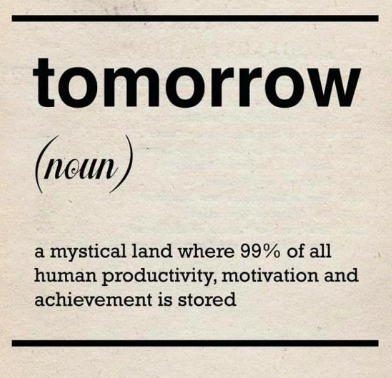Place Holder

Why do today what you can do ten minutes before your next class? This ideology seems to be the center of procrastination. We’ve all been there, each with an excuse such as ‘we were just so busy’ (watching our favorite show) or ‘we didn’t really understand the project’ (because we didn’t read the instructions), but what if some scientists are saying that procrastination can be good? There are a few caveats to this; the procrastination cannot be what Frank Parknoy, a professor of finance and law, calls “passive procrastination”, which is completely ignoring one’s to-do list and not acknowledging you are doing it. Sitting on the couch watching a show you don’t even care about to avoid doing your math homework is not good for you, however, “active procrastination” which is not doing something you need to do but doing something that is also productive such as applying for colleges instead of writing your Journalism article, may actually teach you a skill called “managing delays”. The problem isn’t if we should procrastinate because procrastination is unavoidable. We simply must learn to procrastinate the right way.
Scenario: Your mom texts you and tells you to go and take the meat out of the freezer so it can thaw for dinner. She always gets home at 6 o’clock, and it would be easy to get up and walk five feet to the fridge right after you read the text, but do you? No, you wait until the last possible second and then do everything you can to make it look like you did when she told you to. Well, that same kind of logic is used in many professional settings. The question really at hand here is “what is the longest amount of time I can take before doing this?” Tennis players do this when
they are serving and returning the ball. They strive for the “perfect” stroke to free up the most amount of time before having to return the ball. Plus, in the end, doesn’t the meat still get thawed for dinner either way?
This article should have a disclaimer because it isn’t about how procrastination is good for you. It’s about how it CAN be good for you if you learn to use it to your advantage. Not completing a project in time does not make you the next Serena Williams, however, learning to have priorities and becoming good at managing delays is something everyone should learn because you never know when you might…. I guess I’ll finish this later.


















